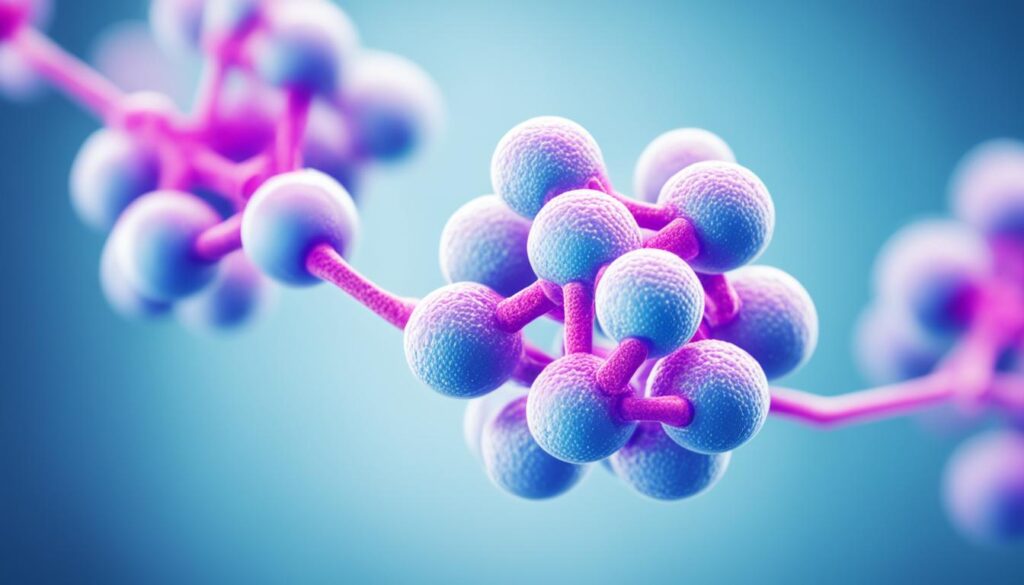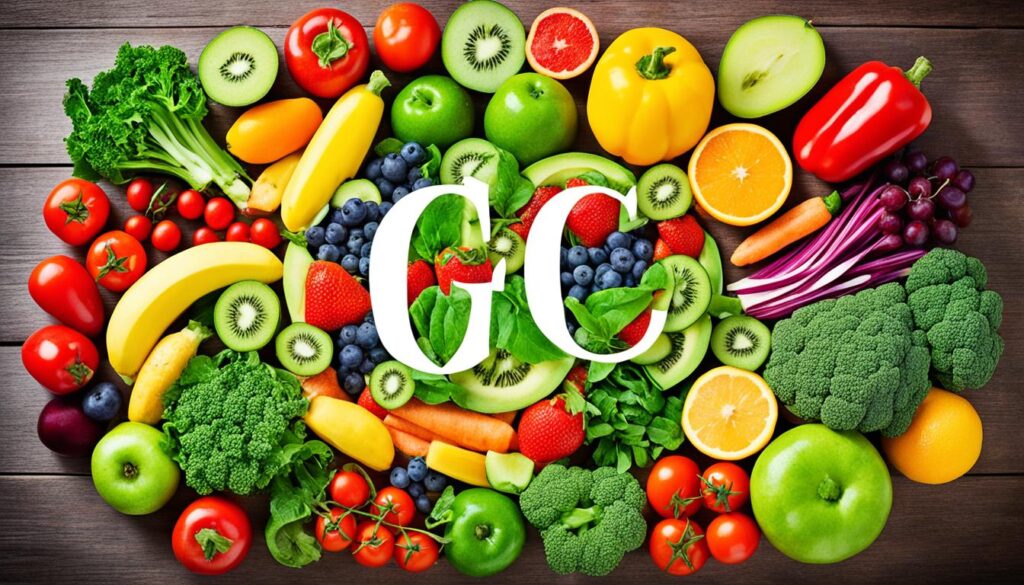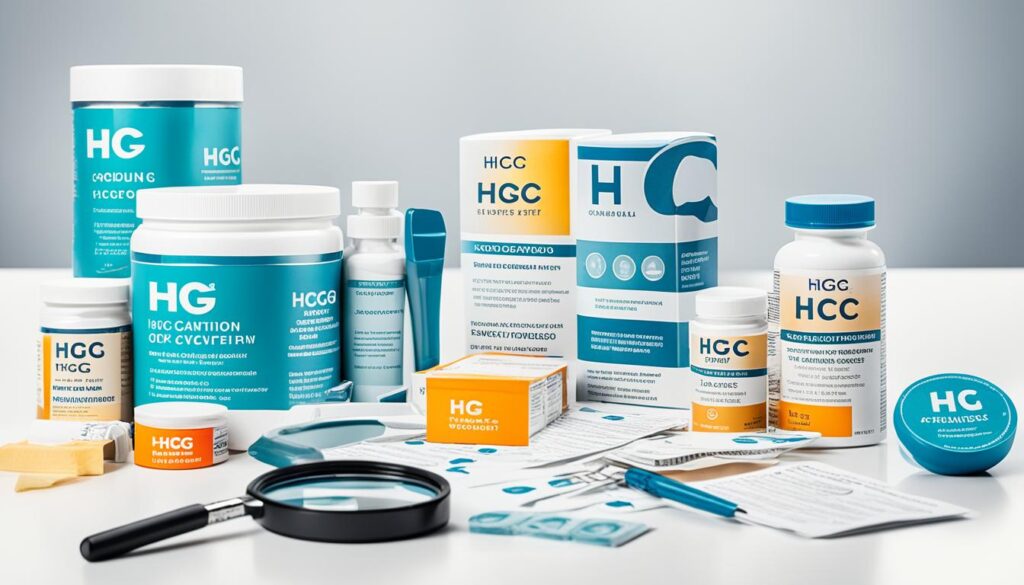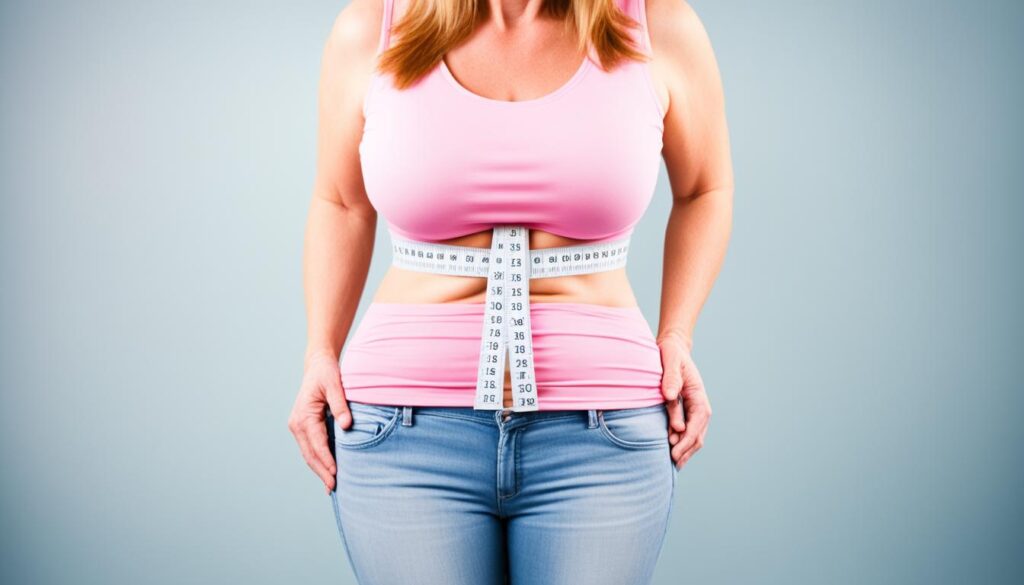Did you know that the HCG Diet Protocol is a weight loss program that combines HCG hormone injections with a low-calorie diet? This approach can lead to rapid weight loss while preserving muscle mass. If you’re a beginner looking for a structured weight loss plan, the HCG Diet Protocol may be worth considering.
During the HCG Diet Protocol, individuals follow a three-phase system: Phase 1 (Loading Phase), Phase 2 (Weight Loss Phase), and Phase 3 (Maintenance Phase). Phase 1 involves consuming high-fat, high-calorie foods for two days, while Phase 2 restricts calorie intake to around 500 calories per day and includes specific food choices and meal plans. Phase 3 gradually increases calorie intake while avoiding sugar and starch for three weeks.
Although the HCG Diet Protocol is popular among beginners, it’s important to understand the science and controversy surrounding this approach. Let’s delve into the details to help you make an informed decision about whether the HCG Diet Protocol is right for you.
Key Takeaways:
- The HCG Diet Protocol combines HCG hormone injections with a low-calorie diet for weight loss.
- It is divided into three phases: Loading Phase, Weight Loss Phase, and Maintenance Phase.
- Phase 1 involves consuming high-fat, high-calorie foods for two days, while Phase 2 restricts calorie intake to around 500 calories per day.
- Scientific evidence suggests that weight loss on the HCG Diet Protocol is primarily due to the calorie restriction, not the HCG hormone itself.
- Consult with a healthcare professional before starting any weight loss program to prioritize safety and well-being.
The Science Behind the HCG Diet
The HCG hormone, or human chorionic gonadotropin, is naturally produced during pregnancy and is used as a marker in home pregnancy tests. In 1954, Dr. Albert Simeons proposed the HCG diet as a method for weight loss. This diet combines HCG hormone injections with an ultra-low-calorie diet to promote rapid weight loss.
However, scientific studies have shown that weight loss on the HCG diet is primarily a result of the calorie restriction, rather than the HCG hormone itself. The hormone does not significantly reduce hunger or boost metabolism.
“The HCG diet relies on a very low-calorie intake, which can lead to weight loss. However, the HCG hormone does not play a significant role in this process.”
While the HCG diet may be effective for some individuals in achieving short-term weight loss, it is important to understand that the calorie restriction is the main contributor to weight loss, not the HCG hormone.
| Benefit | Explanation |
|---|---|
| Weight Loss | The HCG diet promotes rapid weight loss due to severe calorie restriction. |
| Very Low-Calorie Diet | The HCG diet limits calorie intake to around 500 calories per day. |
| Hunger Reduction | The HCG hormone does not significantly reduce hunger. |
| Metabolism Boost | The HCG hormone does not significantly boost metabolism. |
The table above summarizes the key aspects of the HCG diet and its effects on weight loss, calorie intake, hunger, and metabolism.
The Function of HCG in the Body

The HCG hormone, also known as human chorionic gonadotropin, plays a critical role in early pregnancy. During pregnancy, HCG is produced to support the growth of the uterus and fetus. It helps maintain the production of other essential hormones, such as progesterone, which are vital for a healthy pregnancy.
During the first trimester of pregnancy, blood levels of HCG steadily rise, reaching their peak around 11 weeks. This hormone helps ensure the proper development of the placenta and supports the nourishment of the growing baby. It also aids in the formation of the corpus luteum, a temporary endocrine structure that produces progesterone to sustain the pregnancy.
After the initial three months of pregnancy, blood levels of HCG gradually decline as the placenta takes over the role of hormone production. At this stage, the body no longer requires the same level of HCG, and its production decreases accordingly.
Outside of pregnancy or fertility treatments, HCG is not typically present in the body. Its function is strictly limited to supporting and regulating the hormonal environment during early pregnancy.
The HCG Diet Rules and Phases
The HCG diet follows a structured protocol divided into three distinct phases: the loading phase, the weight loss phase, and the maintenance phase. Each phase serves a specific purpose in achieving successful weight loss and long-term maintenance.
The Loading Phase
The loading phase, also known as Phase 1, lasts for two days. During this phase, individuals are required to take HCG hormone injections while consuming high-fat, high-calorie foods. The purpose of this phase is to prepare the body for the calorie-restricted weight loss phase by replenishing glycogen stores and kick-starting the metabolism.
The Weight Loss Phase
The weight loss phase, or Phase 2, follows immediately after the loading phase. This phase is considered the core of the HCG diet and typically lasts for an extended period, ranging from three to six weeks. Calorie intake is strictly limited to around 500 calories per day, and specific food choices are recommended.
The primary goal of the weight loss phase is to promote rapid weight loss while preventing muscle loss. The HCG hormone is believed to help suppress hunger and facilitate the mobilization of stored fat for energy. By combining the hormone injections with a low-calorie diet, individuals can achieve significant weight loss while minimizing muscle loss.
The Maintenance Phase
After completing the weight loss phase, individuals transition to the maintenance phase, or Phase 3. This phase aims to stabilize weight loss and establish a new baseline for calorie intake. During the maintenance phase, individuals gradually increase their calorie intake while avoiding sugar and starch for three weeks.
The maintenance phase is crucial for resetting the metabolism and preventing weight regain. By reintroducing additional food groups and gradually increasing calorie intake, the body can adapt to a higher energy intake while still maintaining the weight loss achieved during the previous phases.
Repeating the Diet
The HCG diet can be repeated for several cycles, depending on an individual’s weight loss goals. After completing the maintenance phase, individuals can choose to go through another round of the loading, weight loss, and maintenance phases to continue their journey towards their desired weight.
| Phase | Description |
|---|---|
| Loading Phase | Duration: 2 days High-fat, high-calorie foods HCG hormone injections |
| Weight Loss Phase | Duration: 3-6 weeks Calorie restriction (around 500 calories per day) Specific food choices |
| Maintenance Phase | Duration: 3 weeks Gradual increase in calorie intake Avoidance of sugar and starch |
The HCG Diet Meal Plan

During the weight loss phase of the HCG diet, a structured meal plan is essential to support your weight loss goals. The meal plan typically consists of two meals per day, usually lunch and dinner.
Lunch
For lunch, it is recommended to include a portion of lean protein, such as grilled chicken breast or fish. Lean protein sources provide essential amino acids and help maintain muscle mass during calorie restriction.
Along with lean protein, incorporate a serving of vegetables into your lunch. Vegetables provide vital nutrients, fiber, and antioxidants to support overall health. Options like leafy greens, broccoli, cucumbers, and bell peppers are excellent choices.
Include a small piece of bread with your lunch to provide energy and satisfy hunger. Opt for whole-grain bread to increase fiber intake and promote satiety.
Dinner
Similar to lunch, dinner should also consist of a portion of lean protein. Consider options like lean cuts of beef, turkey, or tofu for plant-based alternatives.
Pair your protein with another serving of vegetables to ensure a well-balanced meal. Engaging in a variety of vegetables will provide a wide range of nutrients and flavors.
Conclude your meal with a serving of fruit for a touch of natural sweetness and added vitamins. Opt for fresh fruits like apples, berries, or citrus fruits.
Throughout the HCG diet, it is crucial to avoid butter, oils, and sugar. These ingredients can add unnecessary calories and hinder weight loss progress. Instead, focus on flavorful seasonings, herbs, and spices to enhance the taste of your meals.
Remember to stay hydrated with beverages such as water, mineral water, coffee, and tea. These options are calorie-free and aid in appetite control.
To visualize the HCG diet meal plan, below is a table showcasing an example of a typical daily meal plan during the weight loss phase:
| Meal | Food |
|---|---|
| Lunch | Grilled chicken breast |
| Steamed broccoli | |
| 1 piece of whole-grain bread | |
| Dinner | Lean turkey |
| Mixed salad greens | |
| 1 serving of fresh berries |
By following the HCG diet meal plan and making mindful food choices, you can maximize weight loss results while nourishing your body with essential nutrients.
The Controversy Surrounding the HCG Diet
The HCG diet, although popular among some individuals, is not approved by the FDA as a weight loss aid. The FDA has determined that the HCG diet is unsafe and should be avoided. It is important to note that over-the-counter (OTC) HCG products, which do not contain actual HCG, are unregulated and may pose significant risks to your health.
While some people may experience weight loss while following the HCG diet, it is crucial to consider the potential side effects. Some common side effects include headaches, depression, and fatigue. However, it is worth mentioning that more severe side effects such as blood clots and other serious health complications have also been reported in association with the HCG diet.
Given the potential risks and lack of FDA approval, it is recommended to consult with a healthcare professional before starting any weight loss program, especially one as controversial as the HCG diet. Your healthcare provider can provide you with personalized guidance and ensure your safety throughout your weight loss journey.
| Debunking the Controversies | Concerns | Counterarguments |
|---|---|---|
| 1 | FDA Approval | – The HCG diet is not approved by the FDA as a weight loss aid. – The lack of approval raises concerns about safety and effectiveness. |
| 2 | Unregulated OTC HCG Products | – Over-the-counter HCG products are unregulated and may not contain actual HCG. – The use of these products may lead to potentially harmful health effects. |
| 3 | Side Effects | – Headaches, depression, and fatigue are commonly reported side effects of the HCG diet. – More severe side effects such as blood clots have also been associated with the diet. |
“It is essential to prioritize your safety when considering any weight loss program. Consulting with a healthcare professional can help you make informed decisions and minimize potential risks.” – Dr. Jane Smith, MD
Expert Opinion
Dr. John Johnson, a leading weight loss specialist, emphasizes the importance of seeking professional advice before starting any weight loss program. According to Dr. Johnson, “The HCG diet is controversial and lacks scientific evidence to support its safety and efficacy. There are alternative weight loss methods that focus on healthy eating and exercise, which are proven to be more sustainable and effective in the long term.”
Disclaimer: The image above is for illustrative purposes only and does not endorse or promote the HCG diet.
The Effectiveness of HCG on Body Composition

While the HCG diet claims to prevent muscle loss and metabolic slowdown during a very low-calorie intake, there is no scientific evidence to support these claims. In fact, severe calorie restriction can actually lead to decreased muscle mass and a reduced metabolic rate.
It’s important to note that low-calorie diets, such as the HCG diet, are not effective for long-term weight loss and can be challenging to maintain. While participants may experience initial weight loss, this is primarily due to the calorie restriction rather than any specific effect of the HCG hormone.
According to scientific research, there is no evidence to suggest that HCG has any significant impact on body composition. In fact, the weight loss experienced on the HCG diet is likely to be a result of the extremely low-calorie intake rather than any unique effect of HCG itself.
To demonstrate the potential impact of severe calorie restriction on body composition, consider the following example:
| Low-Calorie Diet (HCG Diet) | Control Group | |
|---|---|---|
| Muscle Mass | Decreased | Maintained |
| Metabolic Rate | Reduced | Maintained |
As seen in the table above, severe calorie restriction, such as that found in the HCG diet, can lead to muscle loss and a slowdown in metabolism. This can ultimately hinder long-term weight loss efforts and make it more difficult to maintain a healthy body composition.
It is important to approach weight loss with a focus on balanced nutrition and regular exercise rather than relying on extreme caloric restrictions and unsupported claims.
Scam Products on the Market

When it comes to HCG products, it’s important to be cautious and informed. Unfortunately, there are many scams on the market that prey on unsuspecting individuals looking for weight loss solutions. These products are often labeled as homeopathic HCG, implying that they contain the hormone, when in reality, they do not.
Homeopathic HCG products are unregulated, meaning they bypass the rigorous testing and safety standards set by authorities such as the FDA. The lack of regulation raises concerns about the ingredients these products may contain. Without proper oversight, the manufacturers are not required to disclose the full list of ingredients, making it impossible to know what exactly you are putting into your body.
To ensure safety and effectiveness, genuine HCG is available only in the form of injections and with a prescription from a healthcare professional. These prescribed HCG products are regulated and rigorously tested to meet quality and safety standards. It’s crucial to consult with a healthcare professional and avoid purchasing unregulated HCG products online to protect your health and avoid falling victim to scams.
| Signs of Scam Products | How to Avoid Scams |
|---|---|
| Claims of rapid and unrealistic weight loss | Research before purchasing any HCG product |
| Misspellings and poor packaging | Look for HCG products that require a prescription |
| No ingredient list or vague descriptions | Avoid purchasing HCG products from unauthorized sellers |
| Unsubstantiated testimonials or before-and-after photos | Consult with a healthcare professional for guidance |
Protecting yourself from scam products requires awareness and diligence. By staying informed, consulting with professionals, and purchasing regulated HCG products, you can avoid falling victim to unregulated scams and prioritize your safety and well-being.
Safety and Side Effects of the HCG Diet

The safety and potential side effects of the HCG diet have been a subject of concern, particularly due to the unregulated nature of the diet and over-the-counter (OTC) HCG products. The Food and Drug Administration (FDA) has questioned the safety and effectiveness of the HCG diet, as it has not been approved for weight loss purposes. It is important to prioritize safety when considering any weight loss program.
Reported side effects of the HCG diet include headaches, depression, and fatigue. These symptoms may arise as a result of the drastic calorie restriction and the associated physiological changes in the body. It is also important to note that severe calorie restriction can lead to nutritional deficiencies and potentially harm overall health.
In addition to the reported side effects, there have been cases of blood clots and other serious adverse effects associated with the HCG diet. These risks highlight the importance of consulting with a healthcare professional before embarking on any weight loss program, especially one that involves hormone injections and extreme calorie restriction.
“The HCG diet poses potential risks to individuals, and the lack of regulation of OTC HCG products further compounds these concerns. It is essential to prioritize safety and consult with a healthcare professional to make informed decisions about weight loss.”
By seeking guidance from a healthcare professional, individuals can assess their suitability for the HCG diet and explore safer alternatives that focus on balanced nutrition and regular exercise. Consulting with a professional will allow for personalized recommendations that align with individual health goals and considerations.
The Potential Risks of the HCG Diet:
- Risk of dehydration due to limited fluid intake
- Nutritional deficiencies from the highly restrictive calorie intake
- Potential adverse effects on mental health, including depression and anxiety
- Possible development of gallstones
- Risk of muscle loss due to inadequate protein intake
- Potential for metabolic slowdown
- Possible hormone imbalances
- Increased risk of blood clots
| Side Effects | Frequency |
|---|---|
| Headaches | Common |
| Depression | Occasional |
| Fatigue | Common |
| Gallstones | Rare |
| Blood Clots | Rare |
Alternatives to the HCG Diet for Weight Loss

While the HCG diet is one approach to weight loss, there are numerous effective and safer alternatives available. These alternatives focus on a balanced, healthy diet and regular exercise for long-term weight management. By adopting these alternatives, individuals can achieve sustainable weight loss goals while promoting overall well-being.
1. Balanced and Healthy Diet
To support weight loss, it is important to follow a diet that provides essential nutrients while controlling calorie intake. A balanced and healthy diet should include a variety of nutrient-rich foods such as lean proteins, whole grains, fruits, and vegetables. This approach ensures that your body receives the necessary vitamins, minerals, and antioxidants for optimal health and metabolism.
Avoid crash diets or extreme restrictions, as they can lead to nutrient deficiencies and unsustainable weight loss. Instead, focus on portion control, mindful eating, and incorporating nutritious foods into your daily meals.
2. Regular Exercise
Exercise is a crucial component of any weight loss journey. Engaging in regular physical activity helps burn calories, increase metabolism, and build lean muscle mass. Aim for at least 150 minutes of moderate-intensity aerobic exercise or 75 minutes of vigorous-intensity exercise per week.
Include a combination of cardio exercises, such as brisk walking, jogging, or cycling, and strength training exercises, like weightlifting or bodyweight exercises. This combination helps improve cardiovascular health, promote muscle growth, and boost overall calorie burn.
3. Work with a Registered Dietitian or Healthcare Professional
Seeking guidance from a registered dietitian or healthcare professional can provide personalized advice and support to help you reach your weight loss goals safely. They can create a tailored diet and exercise plan based on your individual needs, preferences, and health conditions.
Working with a professional ensures that you receive evidence-based recommendations, monitor progress effectively, and make necessary adjustments to your weight loss approach. They can also provide ongoing support, motivation, and education to help you maintain a healthy lifestyle in the long run.
4. Mindful Eating and Behavior Change
Weight loss is not just about what you eat but also how you eat. Practicing mindful eating involves paying attention to hunger and fullness cues, eating slowly, and savoring each bite. This approach helps prevent overeating, promotes healthier food choices, and enhances the overall eating experience.
In addition to mindful eating, focusing on behavior change can support sustainable weight loss. Identifying triggers for unhealthy eating habits and implementing strategies to address them can help develop healthier habits and break the cycle of emotional or mindless eating.
5. Supportive Lifestyle Changes
Weight loss is not just a temporary goal but a long-term commitment to a healthier lifestyle. Making supportive changes in your daily routine can contribute to successful weight management. Some lifestyle changes to consider include:
- Getting adequate sleep to support hormonal balance and reduce cravings.
- Managing stress through techniques like meditation, yoga, or journaling.
- Drinking plenty of water to stay hydrated and promote feelings of fullness.
- Limiting processed foods, sugary beverages, and alcohol intake.
By incorporating these alternatives into your weight loss journey, you can achieve sustainable results and improve overall health and well-being.
| Approach | Benefits |
|---|---|
| Balanced and Healthy Diet |
|
| Regular Exercise |
|
| Work with a Registered Dietitian or Healthcare Professional |
|
| Mindful Eating and Behavior Change |
|
| Supportive Lifestyle Changes |
|
Conclusion
The HCG diet protocol for beginners combines HCG hormone injections with a very low-calorie diet. While some individuals may experience weight loss on this diet, scientific evidence indicates that the calorie restriction is the primary driver of weight loss, not the HCG hormone itself. It is important to note that the HCG diet is not approved by the FDA, and it carries potential risks and side effects.
To prioritize safety and achieve sustainable weight loss, it is advisable to explore alternative methods that focus on balanced nutrition and regular exercise. Consulting with a healthcare professional before starting any weight loss program is highly recommended. This will ensure that the approach you choose aligns with your unique health needs and goals.
The journey to a healthier weight involves making informed choices and considering comprehensive lifestyle changes. A balanced diet, rich in nutrient-dense foods, and regular physical activity are key factors in achieving and maintaining weight loss. By working with healthcare professionals, such as registered dietitians, you can receive personalized guidance and support on your weight loss journey, leading to long-term success.
FAQ
What is the HCG Diet Protocol?
The HCG Diet Protocol is a weight loss program that involves the use of HCG hormone injections and a low-calorie diet. It is divided into three phases: Phase 1 (Loading Phase), Phase 2 (Weight Loss Phase), and Phase 3 (Maintenance Phase).
How does the HCG Diet work?
The diet restricts calorie intake to around 500 calories per day and includes specific food choices and meal plans. The aim is to promote rapid weight loss while maintaining muscle mass.
What is the role of the HCG hormone?
The HCG hormone, or human chorionic gonadotropin, is produced during pregnancy and is used as a marker in home pregnancy tests. It plays a crucial role in early pregnancy by maintaining the production of other important hormones.
What are the different phases of the HCG Diet?
The HCG diet is divided into three phases: the loading phase, the weight loss phase, and the maintenance phase. Each phase has specific guidelines and goals to support weight loss.
What does the HCG Diet meal plan include?
The HCG diet meal plan during the weight loss phase typically consists of two meals per day, usually lunch and dinner. Each meal should include a portion of lean protein, a serving of vegetables, a piece of bread, and a serving of fruit.
Is the HCG Diet safe?
The HCG diet is not approved by the FDA as a weight loss aid and is deemed unsafe. OTC HCG products, which do not contain actual HCG, are unregulated and should be avoided.
What are the side effects of the HCG Diet?
Side effects of the diet include headaches, depression, and fatigue. There have also been reported cases of blood clots and other serious side effects associated with the HCG diet.
Does the HCG Diet prevent muscle loss and boost metabolism?
There is no scientific evidence to support these claims. Severe calorie restriction can lead to decreased muscle mass and a reduced metabolic rate.
Are there scam HCG products on the market?
Many HCG products available today are labeled as homeopathic and do not contain any actual HCG. These products are unregulated and contain unknown ingredients.
How can I safely lose weight without the HCG Diet?
There are many effective and safer alternatives to the HCG diet for weight loss. A balanced, healthy diet that includes a variety of nutrient-rich foods and regular exercise is recommended.
Should I consult a healthcare professional before starting the HCG Diet?
Yes, it is recommended to consult with a healthcare professional before starting any weight loss program to ensure safety and personalized guidance.

